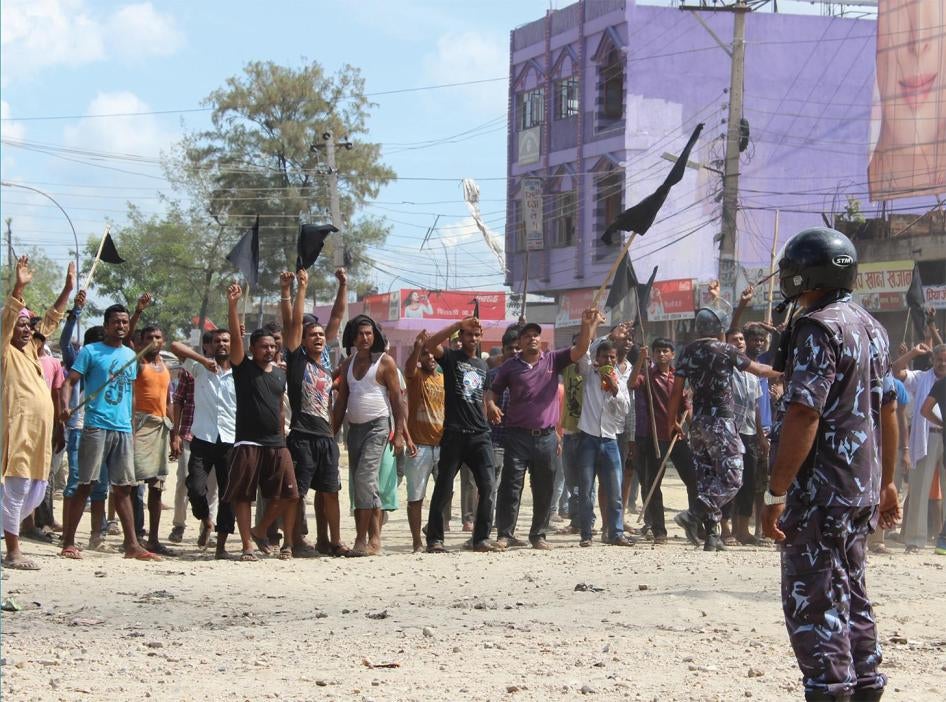(New York) – Nepali authorities should immediately investigate and bring to justice those responsible for killings and other violations during ongoing protests over the constitutional debate, Human Rights Watch said in a new report released today.
At least 45 people were killed during the protests in August and September 2015. The violence included the use of arbitrary and disproportionate force, and extrajudicial killings by the police against protesters; killing of children; and murders of police officers.
“While the drafting of a rights-respecting constitution is an emotional issue in Nepal, disagreements cannot be resolved by committing serious human rights abuses,” said Brad Adams, Asia director. “The government has the responsibility to ensure there are impartial and effective investigations and cannot simply look the other way.”
The 44-page report, “‘Like We Are Not Nepali’: Protest and Police Crackdown in the Terai Region of Nepal,” documents Human Rights Watch investigations into the killings of 25 people, including 16 members of the public and 9 police officers, in five Terai districts between August 24 and September 11, 2015. Human Rights Watch found no evidence that any of these victims were posing a threat at the time that they were killed.
Protest and Police Crackdown in the Terai Region of Nepal
Following a devastating earthquake in late April which led to a severe humanitarian crisis, Nepal’s political parties decided to finally deliver a new constitution after nearly a decade of political stalemate. Despite assurances, the public was given very little time for consultations over the draft before the new constitution was promulgated in September 2015. Shortly after, sustained protests, sometimes involving violence, erupted in ethnic minority areas primarily in the far west and the southern plains of the country with protesters demanding greater political autonomy based on prior agreements.
Human Rights Watch’s report documents the killing of nine police officers, eight of them on August 24 in Tikapur, when some protesters encircled and attacked a small group of outnumbered police with handmade weapons.
Human Rights Watch’s report documents the killing of nine police officers, eight of them on August 24 in Tikapur, when some protesters encircled and attacked a small group of outnumbered police with handmade weapons.
While the drafting of a rights-respecting constitution is an emotional issue in Nepal, disagreements cannot be resolved by committing serious human rights abuses.
Brad Adams
Asia director
Human Rights Watch found credible reports of serious human rights violations after the government deployed security forces to contain the protests. In all five districts Human Rights Watch visited, researchers documented eyewitness accounts of police abuses that included breaking into homes to beat occupants, including women and elderly; using racial insults during violent incidents or threatening to kill members of the public; arbitrarily beating passers-by; and harassing villagers belonging to communities opposing the new constitution.
In Birgunj, two eyewitnesses described how a police officer deliberately opened fire into a hospital. Both eyewitnesses sustained injuries during the incident. In other cases, police used excessive and indiscriminate force, with numerous witnesses describing the police killing unarmed protesters instead of arresting them.
Fourteen-year-old Nitu Yadav was among the protesters. He attempted to hide from the police in some bushes. Four separate eyewitnesses described to Human Rights Watch how police dragged Yadav out of his hiding place, threw him to the ground, and, while an officer stood on his legs, shot him in the face at point-blank range. Doctors who subsequently examined Yadav’s body confirmed that it bore injuries consistent with this account. Witnesses told Human Rights Watch that another unarmed protester, Sanjay Chaudhari, was shot in the back as he attempted to flee. He died shortly after reaching the hospital.
Not only has the government refused to engage in discussions to resolve the ongoing disputes and violence, officials have yet to ensure that police and security forces are held to account for abuses.
On October 12, Khadga Prasad Sharma Oli replaced Sushil Koirala as prime minister.
“Nepal’s new leadership should take immediate steps to stem the tide of abuse that has overtaken Nepal the last few months,” Adams said. “The government needs to order investigations, and publicly call on all security forces to desist from any excessive use of force.”









